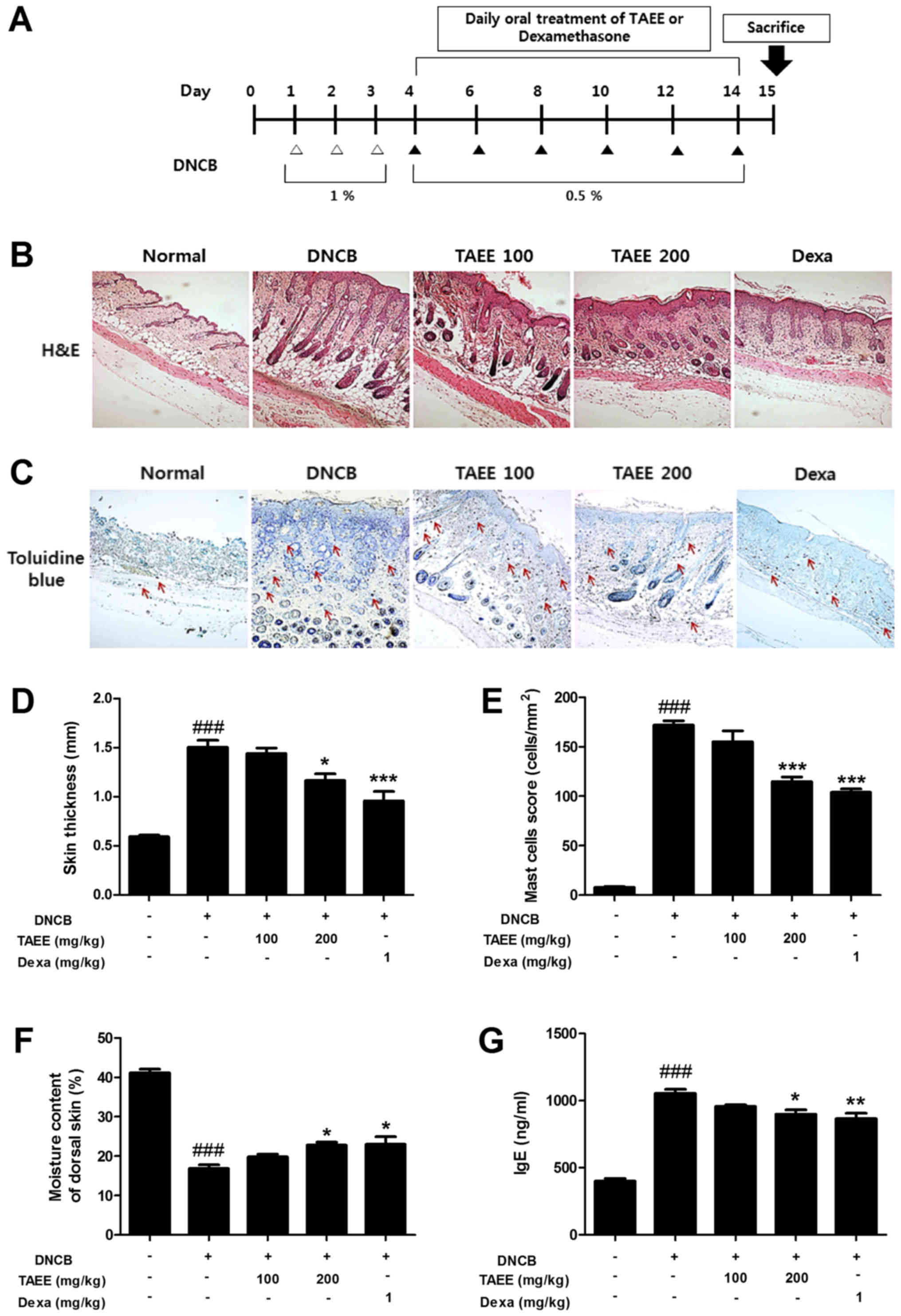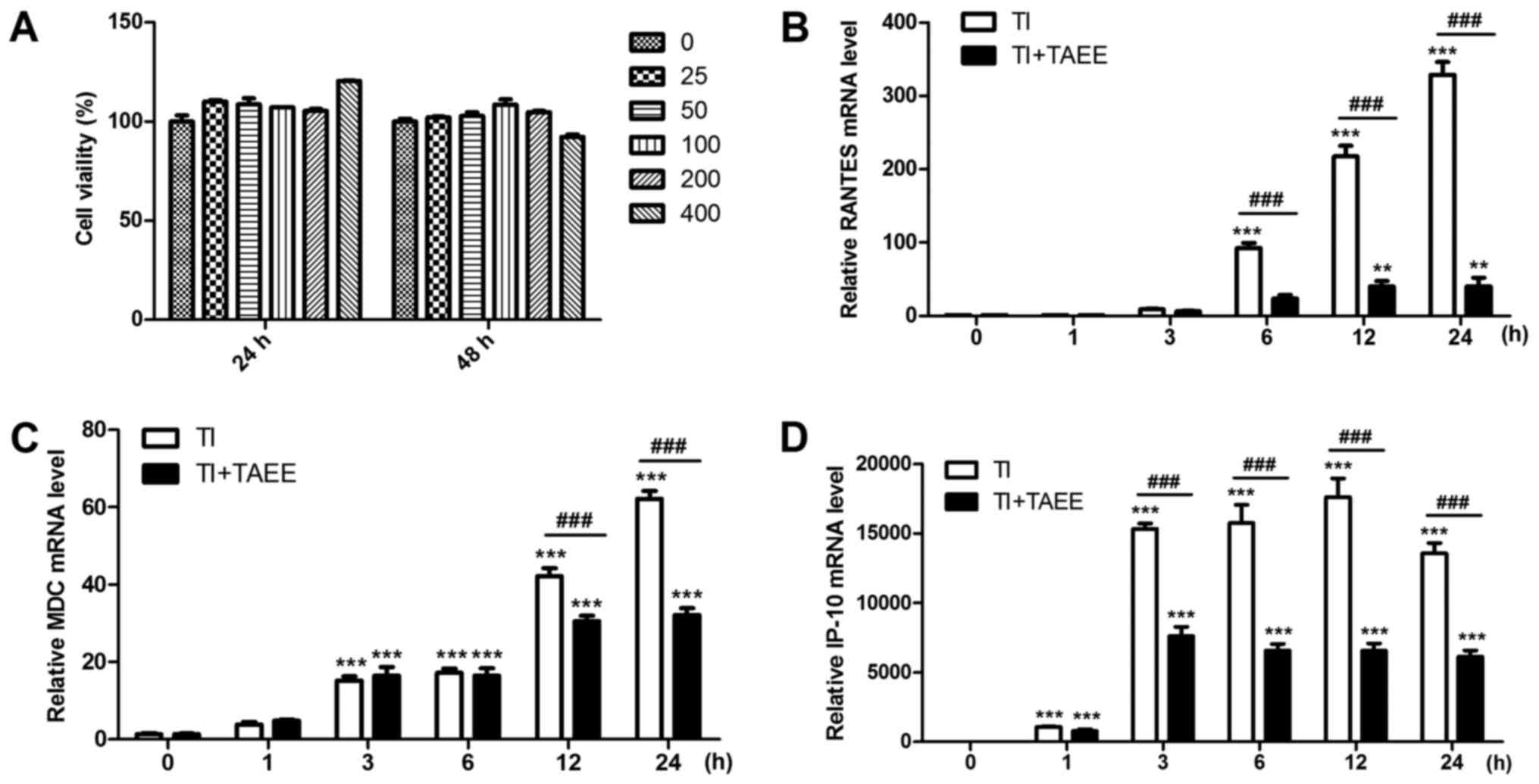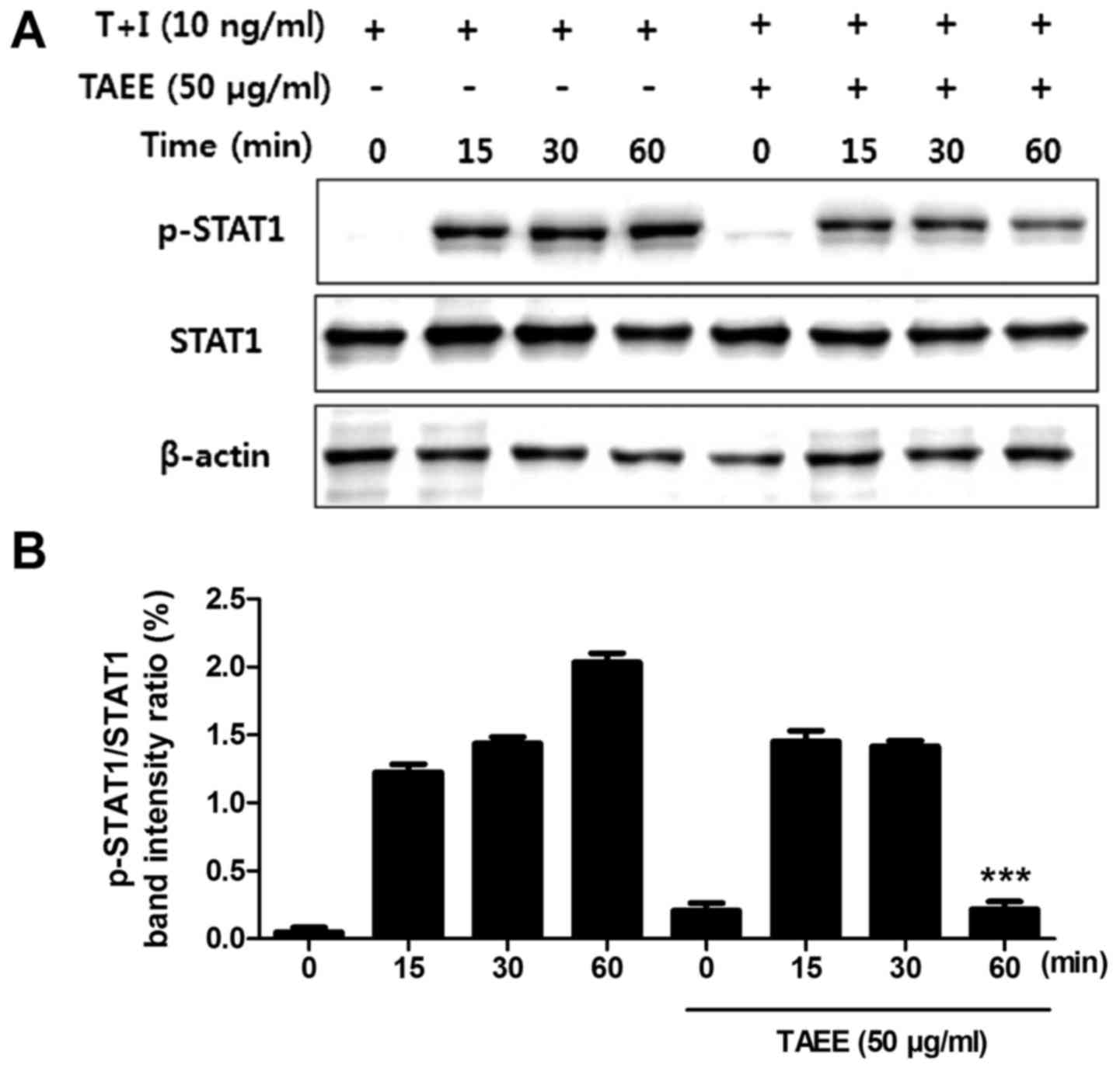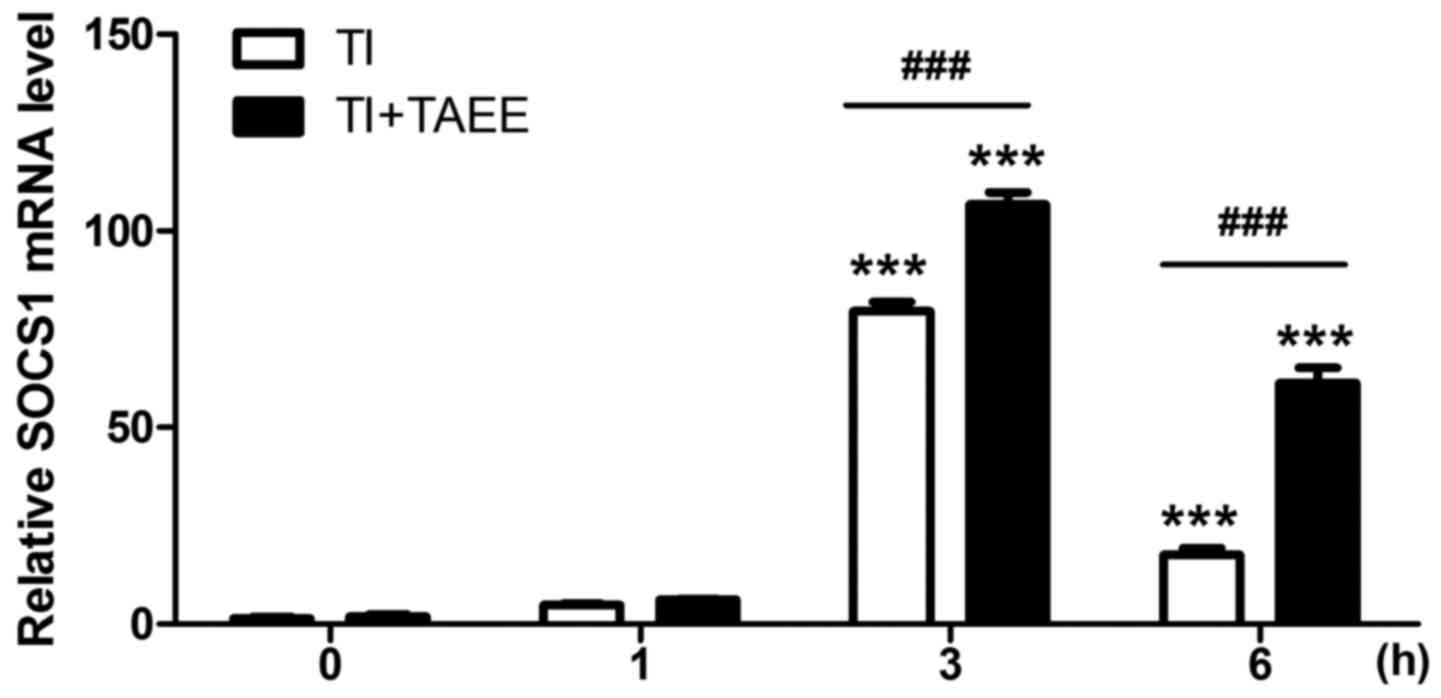|
1
|
Bieber T: Atopic dermatitis. N Engl J Med.
358:1483–1494. 2008. View Article : Google Scholar : PubMed/NCBI
|
|
2
|
Leung DY and Bieber T: Atopic dermatitis.
Lancet. 361:151–160. 2003. View Article : Google Scholar : PubMed/NCBI
|
|
3
|
Udompataikul M and Limpa-o-vart D:
Comparative trial of 5% dexpanthenol in water-in-oil formulation
with 1% hydrocortisone ointment in the treatment of childhood
atopic dermatitis: A pilot study. J Drugs Dermatol. 11:366–374.
2012.PubMed/NCBI
|
|
4
|
Schäkel K, Döbel T and Bosselmann I:
Future treatment options for atopic dermatitis-small molecules and
beyond. J Dermatol Sci. 73:91–100. 2014. View Article : Google Scholar : PubMed/NCBI
|
|
5
|
Jeziorkowska R, Sysa-Jędrzejowska A and
Samochocki Z: Topical steroid therapy in atopic dermatitis in
theory and practice. Postepy Dermatol Alergol. 32:162–166. 2015.
View Article : Google Scholar : PubMed/NCBI
|
|
6
|
Tirgar PR, Thumber BL and Desai TR:
Isolation, characterization and biological evaluation of iron
chelator from Triticum aestivum (wheat grass). Int J Pharma
Bio Sci. 2:288–296. 2011.
|
|
7
|
Das A, Raychaudhuri U and Chakraborty R:
Effect of freeze drying and oven drying on antioxidant properties
of fresh wheatgrass. Int J Food Sci Nutr. 63:718–721. 2012.
View Article : Google Scholar : PubMed/NCBI
|
|
8
|
Lee SH, Lee YM, Lee HS and Kim DK:
Anti-oxidative and anti-hyperglycemia effects of Triticum
aestivum wheat sprout water extracts on the
streptozotocin-induced diabetic mice. Korean J Pharmacogn.
40:408–411. 2009.
|
|
9
|
Ben-Arye E, Goldin E, Wengrower D, Stamper
A, Kohn R and Berry E: Wheat grass juice in the treatment of active
distal ulcerative colitis: A randomized double-blind
placebo-controlled trial. Scand J Gastroenterol. 37:444–449. 2002.
View Article : Google Scholar : PubMed/NCBI
|
|
10
|
Shermer M: Wheatgrass juice and folk
medicine. Sci Am. 299:422008. View Article : Google Scholar
|
|
11
|
Gore RD, Palaskar SJ and Bartake AR:
Wheatgrass: Green blood can help to fight cancer. J Clin Diagn Res.
11:ZC40–ZC42. 2017.PubMed/NCBI
|
|
12
|
Lee SH, Lim SW, Lee YM, Lee HS and Kim DK:
Polysaccharide isolated from Triticum aestivum stimulates
insulin release from pancreatic cells via the ATP-sensitive K+
channel. Int J Mol Med. 29:913–919. 2012.PubMed/NCBI
|
|
13
|
Poudel B, Nepali S, Xin M, Ki HH, Kim YH,
Kim DK and Lee YM: Flavonoids from Triticum aestivum inhibit
adipogenesis in 3T3-L1 cells by upregulating the insig pathway. Mol
Med Rep. 12:3139–3145. 2015. View Article : Google Scholar : PubMed/NCBI
|
|
14
|
Luyen BT, Thao NP, Tai BH, Lim JY, Ki HH,
Kim DK, Lee YM and Kim YH: Chemical constituents of Triticum
aestivum and their effects on adipogenic differentiation of
3T3-L1 preadipocytes. Arch Pharm Res. 38:1011–1018. 2015.
View Article : Google Scholar : PubMed/NCBI
|
|
15
|
Nepali S, Ki HH, Lee JH, Lee HY, Kim DK
and Lee YM: Wheatgrass-derived polysaccharide has antiinflammatory,
anti-oxidative and anti-apoptotic effects on lps-induced hepatic
injury in mice. Phytother Res. 31:1107–1116. 2017. View Article : Google Scholar : PubMed/NCBI
|
|
16
|
Nepali S, Ki HH, Lee JH, Cha JY, Lee YM
and Kim DK: Triticum aestivum sprout-derived polysaccharide
exerts hepatoprotective effects against ethanol-induced liver
damage by enhancing the antioxidant system in mice. Int J Mol Med.
40:1243–1252. 2017. View Article : Google Scholar : PubMed/NCBI
|
|
17
|
Ki HH, Poudel B, Lee JH, Lee YM and Kim
DK: In vitro and in vivo anti-cancer activity of dichloromethane
fraction of Triticum aestivum sprouts. Biomed Pharmacother.
96:120–128. 2017. View Article : Google Scholar : PubMed/NCBI
|
|
18
|
Ki HH, Hwang SW, Lee JH, Kim YH, Kim DK
and Lee YM: A dichloromethane fraction of Triticum aestivum
sprouts reduces allergic immune response through inhibiting Th2
differentiation in ovalbumin-immunized mice. Mol Med Rep.
16:3535–3541. 2017. View Article : Google Scholar : PubMed/NCBI
|
|
19
|
Werner Y and Lindberg M: Transepidermal
water loss in dry and clinically normal skin in patients with
atopic dermatitis. Acta Derm Venereol. 65:102–105. 1985.PubMed/NCBI
|
|
20
|
Bieber T: Atopic dermatitis. Ann Dermatol.
22:125–137. 2010. View Article : Google Scholar : PubMed/NCBI
|
|
21
|
Sallusto F, Mackay CR and Lanzavecchia A:
The role of chemokine receptors in primary, effector, and memory
immune responses. Annu Rev Immunol. 18:593–620. 2000. View Article : Google Scholar : PubMed/NCBI
|
|
22
|
Park JH, Kim MS, Jeong GS and Yoon J:
Xanthii fructus extract inhibits TNF-α/IFN-γ-induced Th2-chemokines
production via blockade of NF-κB, STAT1 and p38-MAPK activation in
human epidermal keratinocytes. J Ethnopharmacol. 171:85–93. 2015.
View Article : Google Scholar : PubMed/NCBI
|
|
23
|
Song MM and Shuai K: The suppressor of
cytokine signaling (SOCS) 1 and SOCS3 but not SOCS2 proteins
inhibit interferon-mediated antiviral and antiproliferative
activities. J Biol Chem. 273:35056–35062. 1998. View Article : Google Scholar : PubMed/NCBI
|
|
24
|
Croker BA, Kiu H and Nicholson SE: SOCS
regulation of the JAK/STAT signalling pathway. Semin Cell Dev Biol.
19:414–422. 2008. View Article : Google Scholar : PubMed/NCBI
|
|
25
|
Spergel JM and Paller AS: Atopic
dermatitis and the atopic march. J Allergy Clin Immunol. 112 6
Suppl:S118–S127. 2003. View Article : Google Scholar : PubMed/NCBI
|
|
26
|
Saeki H, Nakahara T, Tanaka A, Kabashima
K, Sugaya M, Murota H, Ebihara T, Kataoka Y, Aihara M, Etoh T, et
al: Clinical practice guidelines for the management of atopic
dermatitis 2016. J Dermatol. 43:1117–1145. 2016. View Article : Google Scholar : PubMed/NCBI
|
|
27
|
Arellano FM, Wentworth CE, Arana A,
Fernández C and Paul CF: Risk of lymphoma following exposure to
calcineurin inhibitors and topical steroids in patients with atopic
dermatitis. J Invest Dermatol. 127:808–816. 2007. View Article : Google Scholar : PubMed/NCBI
|
|
28
|
Santoro D, Bohannon M, Ahrens K, Navarro
C, Gatto H and Marsella R: Evaluation on the effects of 0.1%
Peumus boldus leaf and Spiraea ulmaria plant extract
combination on bacterial colonization in canine atopic dermatitis:
A preliminary randomized, placebo controlled, double-blinded study.
Res Vet Sci. 118:164–170. 2018. View Article : Google Scholar : PubMed/NCBI
|
|
29
|
Yin J, Yoon SH, Ahn HS and Lee MW:
Inhibitory activity of allergic contact dermatitis and atopic
dermatitis-like skin in BALB/c mouse through oral administration of
fermented barks of Alnus sibirica. Molecules. 23:pii: E450.
2018.
|
|
30
|
Rajesh M and Ramesh BB: A study on wheat
grass and its nutritional value. Food Sci Qual Manage. 2:1–8.
2011.
|
|
31
|
Knor T, Meholjić-Fetahović A and
Mehmedagić A: Stratum corneum hydration and skin surface pH in
patients with atopic dermatitis. Acta Dermatovenerol Croat.
19:242–247. 2011.PubMed/NCBI
|
|
32
|
Jeong SJ, Lim HS, Seo CS, Kim JH, Jin SE,
Yoo SR and Shin HK: Traditional herbal formula Jakyakgamcho-tang
(Paeonia lactiflora and Glycyrrhiza uralensis)
impairs inflammatory chemokine production by inhibiting activation
of STAT1 and NF-κB in HaCaT cells. Phytomedicin. 22:326–332. 2015.
View Article : Google Scholar
|
|
33
|
Lim HS, Jin SE, Kim OS, Shin HK and Jeong
SJ: Alantolactone from saussurea lappa exerts
antiinflammatory effects by inhibiting chemokine production and
STAT1 phosphorylation in TNF-α and IFN-γ-induced in HaCaT cells.
Phytother Res. 29:1088–1096. 2015. View
Article : Google Scholar : PubMed/NCBI
|



















